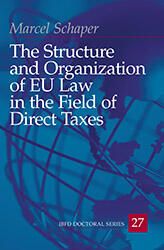Winner of the 2013 European Academic Tax Thesis Award awarded by the European Association of Tax Law Professors (EATLP).
Why this book?
This book researches the complex functional subsystem of EU law in the field of direct taxes that has emerged from the many decisions of the Court of Justice of the European Union. Although some regard this form of European control as an undemocratic attack on national sovereignty, this book finds that the Court consistently recognizes the legitimate right of Member States to levy taxes in their national territory.
The Structure and Organization of EU Law in the Field of Direct Taxes analyzes the complete body of the Court’s case law on direct taxes. Using network science as a method of research, this book aims to uncover the structure and organization of this functional subsystem of EU law in an empirical manner. Is there cohesion in the body of case law? What are the most important precedents and the most essential legal norms? How was general EU law adopted in the field of direct taxes over the years? This book covers these key questions and more.
Special attention is paid to the judicial rule of the balanced allocation of the power to impose tax between the EU Member States, which the Court first established in its (in)famous ruling in Case C-446/03, Marks & Spencer. This book presents an in-depth research with regard to this overriding legal norm and examines its relationships to other justifications for tax restrictions on the freedom of movement.
Instead of focusing on the reasoning and grounds for judgment in individual rulings, this book offers a bird’s eye view of the complex system of EU law in the field of direct taxes that derives from the EU Treaties. This framework of a legal doctrine will be useful in academic and practitioner circles with a keen interest in the Europeanization of tax law.
Downloads
This book is part of the IBFD Doctoral Series
View other titles in the series
Author(s)
Marcel Schaper is assistant professor at the Maastricht Centre for Taxation of Maastricht University, the Netherlands. He has extensive experience in teaching international and European tax law in an international academic environment.
